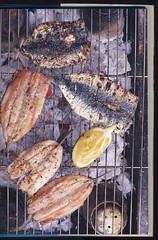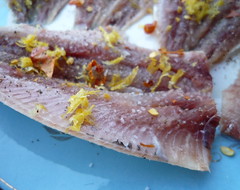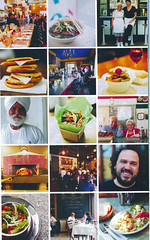Thrill of the grill 1
Sure, there's something undeniably magical about barbecue that's been cooked slow and low with patience and care, the kind of barbecue that's the focus of Saveur's June/July 2011 "BBQ Nation" double issue. We love the entire culture that surrounds this heritage form of barbecue. We love all the fussing, the beer-drinking, and the jawing that goes into an all-day barbecue session. And we never cease to be amazed by the transformative power of that holy smoke coupled with the mild heat from those ashy coals.
 fig. a: thrill of the grill
fig. a: thrill of the grill
But sometimes you just want the pure thrill of the grill. You want the slight blackening, the light smokiness, the caramelized flavors, and the primal pleasures of cooking directly over flames. You want the payoff to come sooner rather than later. You want to take full advantage of the fact that cooking over a hot grill can be quick and easy.
Among our favorite sources for this kind of grilling are Rose Gray and Ruth Rogers, the chefs behind London's legendary River Cafe and the authors of the utterly brilliant "Easy" series: River Cafe Cookbook Easy (2003) and Italian Two Easy: Simple Recipes From the London River Cafe (2006). Both cookbooks fall under the "simple recipes for busy people" genre, but their concision, their clarity, and their clever minimalist design put them in the top of their class.
Years ago, we featured a recipe of theirs from River Cafe Cookbook Easy that we'd adapted for the grill. The recipe was for pork chops with lemon, and Gray and Rogers called for it to be executed it in an ovenproof griddle pan, but it was a lovely late-spring afternoon and we were very much in a grilling state of mind, and our simple adaptation of their simple recipe (two ingredients!) turned out beautifully. We could have just as easily chosen from the dozens of grilling recipes contained in Gray and Rogers' two books, but, in that particular case, we started with a very specific ingredient: the pork chops.
One recipe that we haven't had to adapt, and that's been a favorite around here recently, is a recipe that appears in the "grilled fish & meat" chapter of Italian Two Easy: Simple Recipes From the London River Cafe and that bears a typically matter-of-fact title: Flattened Sardine, Chile, Lemon.
 fig. b: sardines by River Cafe
fig. b: sardines by River Cafe
Four ingredients--that's it, that's all. And once you've figured out how to butterfly your sardines, you're almost to the finish line, because flattened sardines cook even faster than whole ones.
The lemon and the olive oil are no-brainers. They're both staples of Mediterranean grilling. It's the butterfly technique, the use of the lemon zest, and the added kick of the chiles that are the stroke of genius here.
Flattened Sardine, Chile, Lemon
16 sardines
4 dried hot chiles
5 lemons
extra-virgin olive oil
To flatten the sardines, cut off the head and then prize open the fish. Press down to loosen the bone, then remove it from the flesh, pulling gently with your fingers.
Crumble the chiles. Finely grate the zest from the three lemons; halve the remaining lemons.
Prepare the grill.
Rub the flesh of the sardines with chile, salt, pepper, and lemon zest.
 fig. c: sardines by AEB
fig. c: sardines by AEBPlace skin-side down on the grill and cook for 1 to 2 minutes. Turn over and grill flesh-side down for 1 to 2 minutes longer.
Drizzle with olive oil, and serve with lemons.
[recipe from Italian Two Easy: Simple Recipes From the London River Cafe, by Rose Gray and Ruth Rogers]
A couple of additional notes:
1) Because the sardines we've been using have been rather delicate, we've found that they cook best on the outer edges of a medium-hot grill (the cooking times remain the same--about two minutes per side). We've been saving the center of our grill for the assortment of vegetables we've been grilling simultaneously: mushrooms, scallions, fennel, ramps, asparagus, etc.
2) Gray and Rogers don't specify, but you're going to need a spatula to handle those delicate sardines once you've placed them on the grill. Other implements tend to tear the poor dears.
This recipe is, well... easy. It's also incredibly delicious--addictive, even. The only trick is finding a good source for your fresh sardines. This is reasonably easy in some parts of North America (like Northern California), but not so easy in others.
Montreal has such a large number of citizens of Portuguese and Italian descent that the demand for sardines is high, but our experience has been that some days of the week are much better than others. We've been having very good luck on Mondays recently, so our sardine fiestas have tended to be on Mondays.
This recipe makes for a great starter for a group, but it also makes for a great light meal for two, with a salad, some bread, and a crisp white. We can attest to that. These sardines--delicate, crispy, piquant, and easy--have been the taste of late spring around here. And, like I said, they're addictive. They might very well become the taste of the summer of 2011 too.
aj
p.s. Rose Gray passed away in early 2010. May she rest in peace.









6 comments:
Looks good. How big is a fresh sardine?
P.S. Of course you meant "prise" open the fish.
What am I thinking. The word is pry. Pry open the fish. (Prise is a noun.)
Hi, Andrea,
not very big, but bigger than they are when they're canned--4-6 inches, roughly--4 each is definitely a light meal
the recipe is verbatim--my dictionary has the following to say about prise vs prize:
prise
verb
variant spelling of prize 2 .
prize 2 |praɪz| (also prise)
verb
another term for pry 2 : : prizing open the door | he prized his left leg free.
Okay, slowly starting to get it. My dictionary (CanOx) says the verb prise is esp. Brit, and is an alternative of prize.
Still, if I ever find some fresh anchovies I plan to pry, not prize, them open. Take that, British cookbook editors!
This sardin dish looks so tasty. I will give it a try soon. Thanks for the post!
you're welcome, Eftychia,
you should definitely try it--you won't be disappointed--say hello to Cyprus for us!
Post a Comment